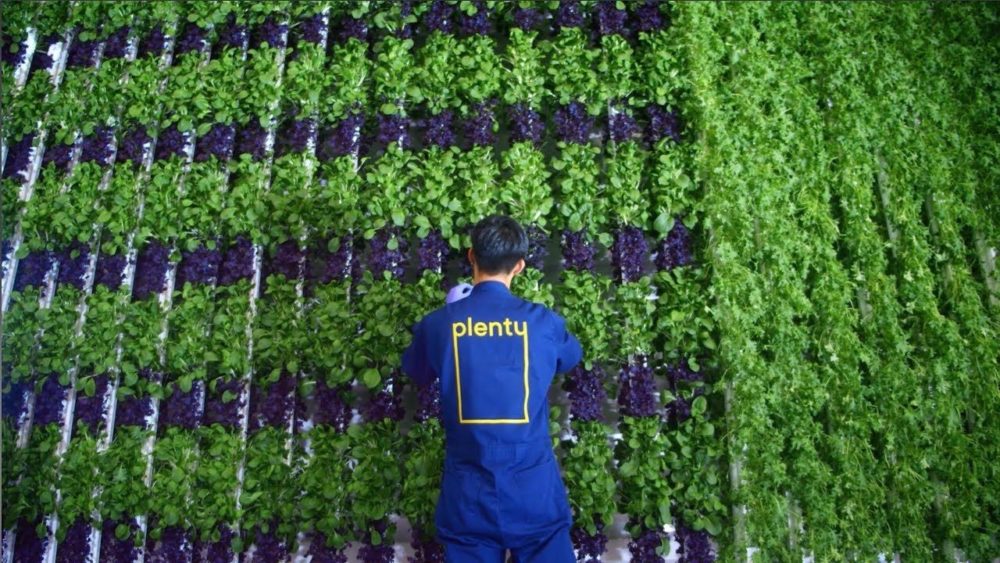Vertical farming startup Plenty has closed a $140 million Series D round led by existing backer SoftBank and new investor Driscoll’s. This round brings the startup’s total funding to $500 million.
“We looked at other vertical farms, and Plenty’s technology was one of the most compelling systems we’d seen for growing berries,” said J Miles Reiter, chairman and CEO at fruit firm Driscoll’s, in a statement.
“We got to know Plenty while working on a joint development agreement to grow strawberries. We were so impressed with their technology, we decided to invest.”
The funds will be used to help with Plenty’s expansion plans, which include a series of commercial collaborations with retail group Albertsons and Driscoll’s. The Albertson’s deal was announced earlier this year and will see Plenty’s branded packaged salad greens stocked at 430 Albertson’s stores.
Its partnership with Driscoll’s will involve R&D around strawberry cultivation. Plenty has been working on the fruit — as well as tomatoes and other crop varieties — for a couple of years, according to Nate Storey, the startup’s co-founder and chief science officer.
“The work we’ve been doing on strawberries aligns very closely with Driscoll’s interest in controlled environment growing,” Storey told AFN. “Plenty is not a single crop. It’s really a platform.”
The startup is also developing a new farm in the inner-city district of Compton, California, that it claims will be the world’s highest-output vertical indoor farm. Storey views Compton as one of the US’s major cultural centers and hopes to help build on that reputation.
“It’s also a food desert. One of our values at Plenty is to bring food to places where that food has not historically been available and to bring jobs to communities that need jobs,” Storey explained. “Believe it or not, Compton has really deep farming roots. If you go back 100 years, Compton was really a farming and agricultural community.”
Plenty also operates an R&D farm in Laramie, Wyoming, and a farm at its headquarters in San Francisco.
Its facilities turn out lettuces that are grown without pesticides, using 1% of the land base and 5% of the water that traditional agriculture uses. It claims to produce 400 times the yield of traditional farming, relying on 100% renewable energy. Each farm can grow 1,500 acres-worth of produce in a building that is the size of a big-box grocery store, according to the startup.
The natural challenges that come with scaling a business are on Storey’s mind, as well as the monumental impact that the startup hopes to have on the world. When asked whether Plenty is contemplating an IPO down the road, Storey declined to comment, though he did give a glimpse of its ambitions.
“We’re not talking about building a few farms here and there. We are talking about doubling or tripling the world’s capacity to grow fresh fruits and vegetables.”
This sentiment is also why Storey sees other indoor farming startups less as competition and more as a needed rising tide.
“Yes, we have competitors. Also, we’re all necessary because the world needs more fresh fruits and vegetables,” he said.
Investors are showing a lot of love for the indoor ag space. Last week, Kentucky-based high-tech greenhouse startup AppHarvest joined the NASDAQ through a merger with special purpose vehicle Novus Capital. The deal raised $475 million at a $1 billion valuation. The outfit is focusing on growing tomatoes and constructing a new 60-acre greenhouse facility in Texas.
Boston container farming startup Freight Farms has also managed to attract corporate involvement through a partnership with Sodexo. Announced in January 2020, the foodservice player is deploying Freight Farms’ containers as part of its contracts with university cafeterias.
Bowery, arguably one of Plenty’s closest competitors, is also offering packaged salad greens through retailers in major metropolitan markets. It recently raised $90 million in a Series B round led by GV and Temasek in December 2018 bringing its total funding to around $168 million.Celebrity chef Tom Colicchio is also an investor.
In September 2020, Bowery announced a retail footprint expansion to 650 stores and some key hires. It brought former Sony executive Michael Lynton and the former founding president of Pinnacle Foods’ $1.1 billion Birds Eye frozen division. Its three indoor farms are located in New Jersey and Maryland.





